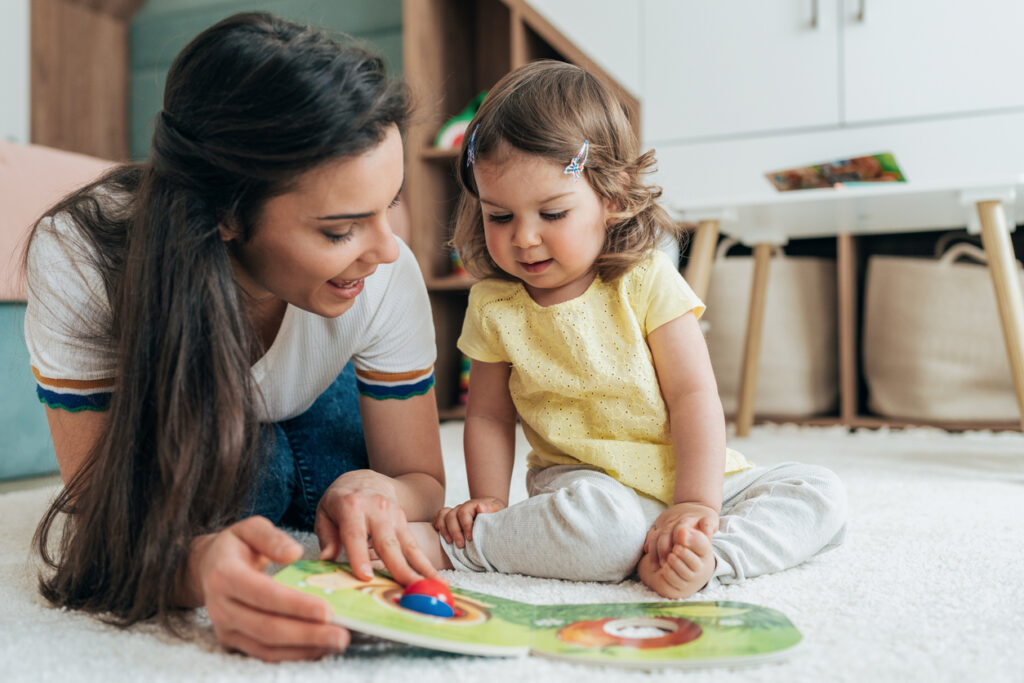Year Three Developmental Milestones


As your toddler nears age three, they’re growing fast—expanding their vocabulary, solving problems, and becoming more independent. These milestones shape their future learning and social skills. If you need support, TLC Therapy Services is here to help.
At 2 ½ Years Old: Independence and Growth
At 2 ½, your toddler is full of curiosity and gaining independence. They’re starting to form simple sentences, follow multi-step directions, and explore their world with growing confidence.
- Language: They point to and name objects or animals in books when asked, demonstrating an expanding vocabulary. They can speak approximately 50 words and begin to form simple sentences with verbs, such as “ Mama cooks.” Starts using personal pronouns like “me,” “I,” or “mine” to express ownership and identity. Able to follow two-step instructions and simple routines.
- Cognitive: They show early problem-solving skills, like standing on a chair to reach something they want. Understands simple routines, such as putting toys away when asked. They engage in pretend play, using objects symbolically—for example, “cooking” with a spoon and mixing in an empty bowl. Beginning to recognize colors, can name at least one or two.
- Social: They often play side by side with other children, watching and perhaps imitating them, and sometimes join in for simple group activities or games. They enjoy showing off new skills, saying things like “Look at me!” to seek attention and approval. They begin to express a wider range of emotions, from excitement to frustration, and may start to use words instead of gestures to communicate feelings.
- Movement: They can remove some clothing items independently, such as socks or a coat. Motor skills improved enough to twist door handles, open containers, or turn pages in a book.
At 3 Years Old: Whys and Wonder
By their third birthday, your toddler’s personality and preferences become clearer. They ask endless “why” questions, engage in storytelling, and are interested in making friends. Their imagination flourishes as they participate in make-believe games, and their ability to express thoughts and emotions becomes more sophisticated.
- Language: They engage in simple conversations with two or more back-and-forth exchanges. They ask questions to get information, such as “Where are we?” or “What is that?” Speech is clear enough for unfamiliar people to understand most of what they say. They can recognize actions in picture books and describe what characters are doing, like playing or singing. They’re also starting to use plurals and form more complex sentences, helping them express their thoughts more clearly.
- Cognitive: They can copy you to draw a circle, showcasing growing hand-eye coordination and artistic expression. Beginning to grasp cause-and-effect concepts, like understanding that pressing a button makes a toy light up. They recognize and avoid potential dangers when warned, such as stepping away from the street.
- Social: They notice other children playing and actively seek to join in, displaying early social skills. Are aware of empathy, reacting when they see someone sad or hurt. They can calm themselves, or be calmed, within 10 minutes of an upset, a sign of increasing emotional regulation. They begin to engage in more cooperative play, taking turns and sharing with others.
- Movement: They can put on simple clothing items like a jacket or loose pants without help. Able to use stacking, stringing and nesting toys, refining their fine motor coordination. They jump forward, climb stairs with alternating feet, and navigate playground structures with growing confidence.
- Feeding: They use a fork and spoon with increasing skill, though they may still default to using their fingers, and drink from an open cup with minimal spills. They chew foods of varying textures effectively, a sign of mature oral motor development.
Activities to Support Your Child’s Development at Home
Supporting your child’s development at home is an opportunity for both learning and bonding. Everyday activities provide countless ways to encourage their growing skills.
1
Keep up frequent conversations, describing your actions and surroundings. Read together daily, ask them open-ended questions about what they think about stories, and sing songs to strengthen their vocabulary and listening abilities. During playtime, encourage them to name objects, actions, and emotions.
2
Cognitive development thrives through activities like simple puzzles, color-sorting, and shape-matching games. Encourage problem-solving by asking guiding questions instead of offering immediate solutions. Let them experiment, make mistakes, and try again.
3
Social and emotional growth can be nurtured by encouraging pretend play with dolls, stuffed animals, or toy kitchens and work benches. Arrange playdates to practice sharing and cooperation. Model positive social behaviors for them to study by using polite words, taking turns, and showing kindness.
4
Confidence in movement can be improved through outdoor play, such as climbing, jumping, and running. Fine motor skills are strengthened with activities like stacking blocks, threading beads, or using child-safe scissors for simple crafts.
5
Mealtimes are an excellent opportunity for skill-building. Let your toddler help with food preparation by retrieving and stirring ingredients, or setting the table. Encourage self-feeding and introduce a variety of textures to support oral motor development.
If your child is not meeting these milestones, take action early. Some signs to watch for include limited speech, difficulty following directions, difficulty interacting with other children, or struggles with basic motor skills like jumping or using utensils.
If your child isn’t reaching these milestones, start by observing their interactions and play to identify specific areas of difficulty. Keep a journal of behaviors or skills you’re concerned about, and talk with your pediatrician about your observations.TLC Therapy Services can help you decide if an evaluation is the right step for your child’s development.
Not sure if your child is meeting expected milestones?
Have questions? TLC Therapy Services is here to help! Call us for an appointment at (770) 696-6649, or fill out the contact form below—we’re happy to guide you toward the right support.
